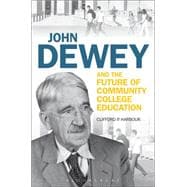Today, community colleges enroll 40% of all undergraduates in the United States. In the years ahead, these institutions are expected to serve an even larger share of this student population. However, faced with increasing government pressure to significantly improve student completion rates, many community colleges will be forced to reconsider their traditional commitment to expand educational opportunity. Community colleges, therefore, are at a crossroads. Should they focus on improving student completion rates and divert resources from student recruitment programs? Should they improve completion rates by closing developmental studies programs and limiting enrollment to college-ready students? Or, can community colleges simultaneously expand educational opportunity and improve student completion?
In John Dewey and the Future of Community College Education, Cliff Harbour argues that before these questions can be answered, community colleges must articulate the values and priorities that will guide them in the future. Harbour proposes that leaders across the institution come together and adopt a new democracy-based normative vision grounded in the writings of John Dewey, which would call upon colleges to do much more than improve completion rates and expand educational opportunity. It would look beyond the national economic measures that dominate higher education policy debates today and would prioritize individual student growth and the development of democratic communities. Harbour argues that this, in turn, would help community colleges contribute to the vital work of reconstructing American democracy.
John Dewey and the Future of Community College Education is essential reading for all community college advocates interested in taking a more active role in developing the community college of the future.









